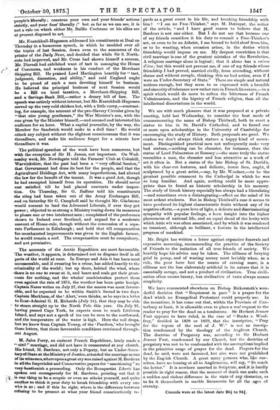M. Jules Ferry, an eminent French Republican, lately made a
4, civil" marriage, and did not have it consecrated at any church. His friend, M. Bardoux, not only a Deputy, but an U.nder-Seere- taryof State at thel!dinistry of Justice, attended the marriage as one of its witnesses,whereuponagreat cry was raised against M. Bardoux in all the Imperialist and Conservative papers for " sanctioning " so very heathenish a proceeding. Only the Bonapartist Likerti has spoken out courageously for M. Bardoux, pointing out that it is one thing-to -be -a sceptic or even an atheist yourself, and quite another to -think it your duty to break friendship with every one who is so ; and if this be right, where is the difference between refusing to -be present at what your friend conscientiously re- gards as a great event in his life, and breaking friendship with him? "I am no Free-Thinker," says M. Detroyat, the writer of the article, "and I have good reason to believe that M. Bardoux is not one either. But I do not see that because one of my friends considers it his duty to commit a Free-Thinker's act, or even to be an Atheist, I am bound to hold aloof from him, or to be wanting, when occasion arises, in the duties which friendship would impose on me. My deepest conviction is that civil marriage is one of the greatest mistakes of the Revolution. A religious marriage alone is logical ; that it alone has a raison dare; but this would not prevent me, if one of my friends whose friendship I had proved, married civilly, from attending, without shame and without scruple, thinking this no bad action, even if I were an Under-Secretary of State." These are simple and natural notions enough, but they seem to us expressed with a breadth and sincerity of tolerance now rather rare in French literature,—in a spirit which would do more to soften the bitterness of French Voltaireanism, and the bigotry of French religion, than all the intellectual dissertations in the world.


































 Previous page
Previous page